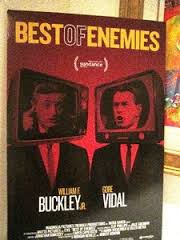
THE BEST OF ENEMIES
US, 2015, 87 minutes, Colour.
Directed by Robert Gordon and Morgan Neville.
The Best of Enemies are Conservative William Buckley Jr and Liberal Gore Vidal. With the focus on these two, and their television debates at the time of the 1968 Republican and Democratic conventions, the film is an entertaining presentation of quite different points of view, personal animosities, debating techniques and invective.
The film, however, is of interest in reminding audiences how much television news footage as well as commentary have changed in the almost half-century since the conventions of 1968. While CBS and NBC were the leaders in television news at the period, with ABC third, the ABC management had the bright idea of inviting two quite bitter antagonists to make comment each night on the ideas behind each of the parties at their conventions. And high ratings were achieved.
William F. Buckley Jr was a Conservative celebrity at the time, editing the National Review, a very conservative magazine of ideas and politics, appearing on the media, a good-looking and pleasant personality who felt self-confidently at home before the cameras. He is vehemently opposed towards everything that Gore Vidal stood for. Gore Vidal came from a rather patrician East Coast American family, his grandfather in Congress, from a wealthy background, his being educated at a boarding school, naval service during World War II, writing bestselling and provocative novels, moving into the media, writing screenplays, continuing to write novels, standing for Congress in 1960 but losing, not afraid of stating his opinions on the state of America, American culture, politics and politicians, issues of sexuality, especially homosexuality.
While the film does focus on the debates and shows excerpts from all of them, it also fills in the background of Buckley and Vidal, with Buckley the less obviously flamboyant character, flamboyant nonetheless, but capitalising on the reputation of Vidal and his controversies, especially with Myra Breckenridge (and included are scenes from the film with Raquel Welch) and his political play and screenplay, The Best Man, and scenes from Ben Hur for whose screenplay he had made contributions. The film also highlights the range of novels that he wrote, covering the period from the 18th to the 20th century situations in the US, a chronicler of the United States.
The film also fills in some of the political background, the 1964 convention with Barry Goldwater, Buckley and his being at home with Richard Nixon and Ronald Reagan, the two rivals in 1968. It shows Vidal’s connection with the Kennedys, relationship by marriage to Jacqueline Kennedy, and his growing antagonism towards Robert Kennedy.
There are quite a number of talking heads, all of them interesting, commenting on the background of the politics, of each of the characters, and of the changing ways of television with this introduction of debate, commentary, which has since become a staple of television programming.
On the Buckley side there is his biographer as well as some astute and pleasant comments from his older brother, as well are some scenes from Buckley himself in the 1980s with president Reagan, in the 1990s on his television interview programmes and his final interview with Koppell and his refusing to answer questions about he how he felt during his dramatic moment in the debates. On the Vidal side, there is a friend and biographer, a study of linguistics and a commentator from the left. And, from the political point of view, one of the significant talking heads is the Conservative Christopher Hitchens. There are also many executives from ABC television.
For those who enjoy wars of words, insinuations and invective, the film is very entertaining, each of the contestants having a way with words and expression. However, the film highlights the key moment when the Vidal called Buckley a crypto-Nazi and Buckley lost his temper, threatening to punch Vidal, and referring to him as queer. While Vidal took it in his calm stride at the time, each wrote lengthy articles about the situation for Esqire magazine. Buckley then sued the Vidal, with Vidal countersuing, a case which spent three years in the courts until suddenly Buckley withdrew, stranding Vidal.
For many of the quotations from Buckley and Vidal, the film has Kelsey Grammer voicing Buckley and John Lithgow voicing Vidal.
The film, in its comparatively brief running time, has a great deal to offer, especially on American politics, culture and media. For those interested in Vidal and his life and career, there is a documentary The United States of Amnesia which is an extensive study of and portrait of the Vidal.
This film shows the value of revisiting these controversies of the past, interpreting them within the context of the time, highlighting how politics in the media have changed over the decades.